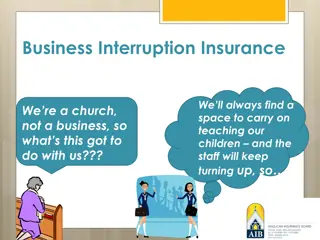Unlocking Keychain Leadership for Growing Young Churches
Explore why specific qualities and elements are not essential for a congregation to grow young, and delve into the core commitment of unlocking keychain leadership in churches aiming for growth among all generations. Keychain leaders share power intentionally with young people, empowering them and fostering trust and creativity in church environments.
Download Presentation

Please find below an Image/Link to download the presentation.
The content on the website is provided AS IS for your information and personal use only. It may not be sold, licensed, or shared on other websites without obtaining consent from the author.If you encounter any issues during the download, it is possible that the publisher has removed the file from their server.
You are allowed to download the files provided on this website for personal or commercial use, subject to the condition that they are used lawfully. All files are the property of their respective owners.
The content on the website is provided AS IS for your information and personal use only. It may not be sold, licensed, or shared on other websites without obtaining consent from the author.
E N D
Presentation Transcript
Growing Young Core Commitment Conversations
10 Qualities Your Congregation DOESN T Need in Order to Grow Young A precise size A trendy location or region An exact age A popular denomination or lack of a denomination An off-the-charts cool quotient A big, modern building A big budget A contemporary worship service A watered-down teaching style A hyper-entertaining ministry program
Core Commitment #1 Unlock Keychain Leadership Fuller s research reflected three-quarters of congregation members named leadership as the secret to their effectiveness. But this is beyond simply launching a student leadership team
Leaders who demonstrate keychain leadership What type of leadership matters in a church that is growing young? Whoever holds the keys has the power to let people in or keep people out Unlocking keychain leadership means sharing power with the right people at the right time
The capabilities, power, and access of leaders that carry the potential to empower young people What do we mean by keys ?
Keychain Leaders are Pastoral and Congregational Leaders who are: Aware of keys on their keychain Willing to take keys off their keychain Intentional about entrusting and empowering ALL generations, including teenagers and emerging adults, with their own set of keys
Keychain leadership is a spirit and commitment demonstrated by BOTH paid and volunteer leaders that permeates EVERY area of the church. If you are willing to entrust your keys to young people, they will trust you with their hearts, their energy, their creativity, and even their friends.
4 Types of Ways People Handle Their Keys 1. Key-less Leaders Young, inexperienced without much authority or access 2. Key-hoarding Leaders Always holding the keys and refusing to give others access they run the show 3. Key-loaning Leaders Letting others borrow keys temporarily, but making sure they are returned quickly
4 Types of Ways People Handle Their Keys 4. Keychain Leaders Very aware of the keys they hold and constantly opening doors for some, while training and entrusting others who are ready for their own set of keys. Have a keen sense for where God is leading but leverage their strengths for the good of the overall church. Able to constantly adjust, stay in touch, and be willing to persevere even if someone feels stuck.
Help young people see the gifts in themselves and provide opportunities to use them. Identify who is ready for keys in your congregation I see this in you and I m going to give you the opportunity to try this.
Six Essentials of Keychain Leadership Keychain leaders are mature not always young. Maturity built out of experiences, failures, or other struggles. Keychain leaders are real not relevant . More transparent, honest and comfortable being themselves. Authentic. Lead with vulnerability YOU go first. Young people are drawn to people who recognize their shortcomings and mistakes. Keychain leaders are warm not distant. Don t have to try to be a best friend to everyone but are approachable and genuinely care and connect.
Six Essentials of Keychain Leadership Keychain leaders know what matters to people not just to other pastors. Value and regularly practice listening to congregants to know what matters most. Keychain leaders entrust and empower others they don t try to be Superpastor . Entrust and empower others, believing they are just as capable as themselves. Keychain leaders take the long view not shortsighted steps. Importance of consistent and long-term leadership
Help young people try keys to different doors than normal Empower Young Leaders to Envision New Doors with New Keys No more business as usual The enthusiasm of young people is not a problem for your church, but rather a big part of your solution.
Jesus didnt seek out those who had it all together. He made time to be with people. We re invited to lead in the same way.























